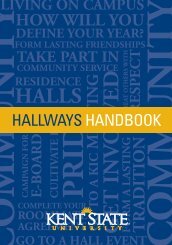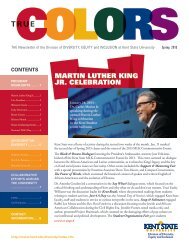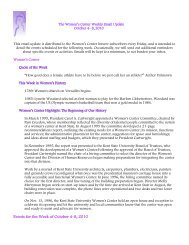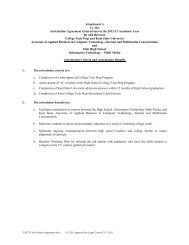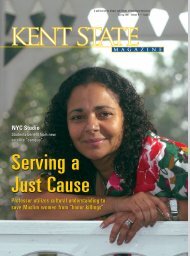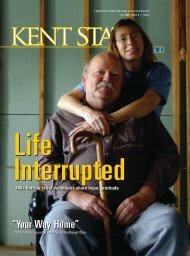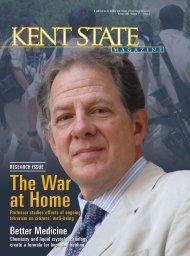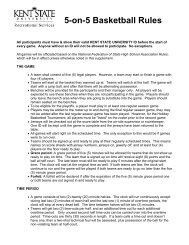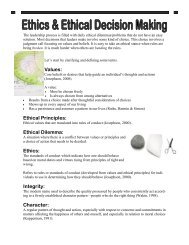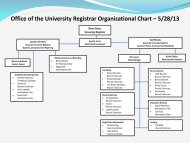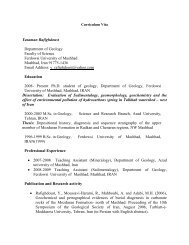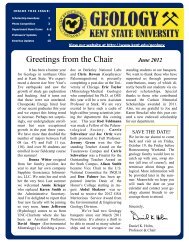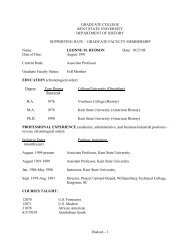E is for Education/Elephant - Kent State University
E is for Education/Elephant - Kent State University
E is for Education/Elephant - Kent State University
Create successful ePaper yourself
Turn your PDF publications into a flip-book with our unique Google optimized e-Paper software.
very happy and prom<strong>is</strong>ed them to work hard so as to achieve my<br />
positive-set goals.”<br />
Kalume comes from a family of 13 children. H<strong>is</strong> parents<br />
are peasant farmers, and when h<strong>is</strong> father feels well enough, he<br />
works in the local mines earning $50 a month. They live on a<br />
seven-acre shamba, or farm, and water <strong>is</strong> a major <strong>is</strong>sue making<br />
their subs<strong>is</strong>tence living very difficult. Kalume says h<strong>is</strong> life<br />
would have been m<strong>is</strong>erable, characterized by doing casual jobs<br />
or being unemployed, had he not met the American couple. “If<br />
Dr. Ken Cushner and h<strong>is</strong> wife had not chosen me, I would never<br />
have had the chance <strong>for</strong> a high school education, and now a<br />
university education,” he says.<br />
Th<strong>is</strong> year, Kalume was accepted to the <strong>University</strong> of<br />
Nairobi’s medical school and <strong>is</strong> applying <strong>for</strong> government-sponsored<br />
support. Cushner’s family has agreed to pay the $2,000-<br />
per-year tuition. “Another option <strong>is</strong> bringing Joseph to <strong>Kent</strong><br />
<strong>State</strong>; he would bring great value to the university,” Cushner<br />
says. He <strong>is</strong> in the process of searching <strong>for</strong> scholarship support<br />
and would provide housing <strong>for</strong> Kalume.<br />
Kalume would love to take pre-medicine courses at <strong>Kent</strong><br />
<strong>State</strong> and hopes to become a renowned neurosurgeon in the<br />
future. “I would also like to ass<strong>is</strong>t a poor child to realize h<strong>is</strong> or<br />
her potential through education,” he adds.<br />
Cushner and h<strong>is</strong> wife continue to support Kalume by<br />
giving money to h<strong>is</strong> local primary school, where he has been<br />
hired as a teacher’s aide. Kalume teaches math, science, Engl<strong>is</strong>h<br />
and social studies, and receives a monthly salary.<br />
Timmons, who also supported a young Kenyan man<br />
through high school in the Mount Kasigau region, says, “We<br />
have so much, and the small amount that it takes to provide a<br />
Photo courtesy of Dr. Ken Cushner<br />
G<br />
<strong>is</strong> <strong>for</strong> global<br />
Photo courtesy of Dr. Ken Cushner<br />
student with a high school education has the potential to make<br />
a difference in a student’s life and the life of h<strong>is</strong> or her future<br />
family.” The young man also was accepted into Kenyatta <strong>University</strong><br />
recently.<br />
In addition to helping students, <strong>Kent</strong> <strong>State</strong> faculty also<br />
support Kenyan teachers, most of whom only have two-year<br />
degrees, by providing funding <strong>for</strong> them to attend a university<br />
<strong>for</strong> four-year degrees. The result has been the <strong>for</strong>mation of a<br />
new partnership with Kenyatta <strong>University</strong> in Nairobi, where<br />
<strong>Kent</strong> <strong>State</strong> co-sponsored a three-day conference on early<br />
literacies in 2004.<br />
F rom obligation to opportunity<br />
While many changes occur and growth continues in the<br />
Kasigau area, one item that remains the same <strong>is</strong> the commitment<br />
of <strong>Kent</strong> <strong>State</strong> faculty and students to the region. Cushner<br />
recalls what one of the Kenyan teachers said to him the first<br />
time he returned: “You did come back. Most people say they’d<br />
love to come back, but you did come back.”<br />
“The educational experience of having a long-term<br />
relationship with committed Americans really goes a long way,<br />
rather than just passing through as tour<strong>is</strong>ts,” Cushner says.<br />
“Kenyans are accustomed to seeing vanloads of tour<strong>is</strong>ts move<br />
through, but we’re connecting with people on a much different,<br />
deeper level. These long-term relationships are critical.”<br />
Un<strong>for</strong>tunately, with the current cr<strong>is</strong><strong>is</strong> of ethnic conflict<br />
in Kenya, a <strong>Kent</strong> <strong>State</strong> contingent did not travel to the country<br />
th<strong>is</strong> past summer. “But the relationship certainly has not<br />
stopped,” Cushner says. He keeps in contact with a few of the<br />
teachers and Kalume through e-mail once a month.<br />
“Africa has long been ignored and <strong>for</strong>gotten. It <strong>is</strong> not a<br />
big source of income <strong>for</strong> the United <strong>State</strong>s like China or India<br />
might be, but it <strong>is</strong> critical that we understand the experiences<br />
of many people across the planet,” Cushner says. “We have<br />
an obligation and responsibility to address those in Africa and<br />
understand the continent more effectively.”<br />
Those who believe they cannot make a difference a continent<br />
away, or even in their own backyards, need only read about<br />
a small project that has made so much impact, thanks to a few<br />
determined people who realize they do have the power to help.<br />
For more in<strong>for</strong>mation and other stories about <strong>Kent</strong> <strong>State</strong>’s<br />
international programs, v<strong>is</strong>it www.kent.edu/magazine.<br />
<strong>Kent</strong> <strong>State</strong> <strong>for</strong>med its earliest relationships in eastern Africa during the 1960s, when<br />
College of <strong>Education</strong> faculty became part of a development ef<strong>for</strong>t in Tanzania, building<br />
schools and bringing Tanzanian students back to the United <strong>State</strong>s <strong>for</strong> their studies.<br />
Since then, many other departments have <strong>for</strong>med African relationships. Today,<br />
faculty from the Department of Pan-African Studies and the Faculty Professional<br />
Development Center are working on a project to digitize primary resources <strong>for</strong> the<br />
purpose of building a library in Senegal, and Pan-African Studies recently signed an<br />
agreement with the <strong>University</strong> of Ghana. In addition, the university has sent student<br />
teachers to South Africa <strong>for</strong> the last seven years, and the College of Nursing <strong>is</strong><br />
currently hosting a Zambian doctoral student at <strong>Kent</strong> <strong>State</strong>. Read about these and<br />
more at www.kent.edu/magazine.<br />
5<br />
K e n t S t a t e U n i v e r s i t y K e n t S t a t e U n i v e r s i t y K e n t S t a t e U n i v e r s i t y K e n t S t a t e U n i v e r s i t y K e n t S t a t e U n i v e r s i t y K e n t S t a t e U n i v e r s i t y K e n t S t a t e U n i v e r s i t y K e n t



